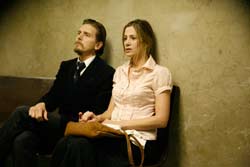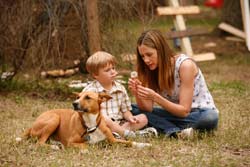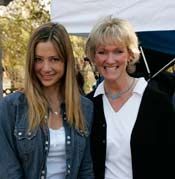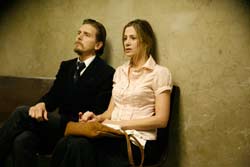Mira Sorvino has played all sorts of roles in almost two decades as an actress—everything from a prostitute in an Oscar-winning performance in 1995’s Mighty Aphrodite to a brilliant entomologist in the horror flick Mimic, from a ditzy blonde in the hilarious Romy and Michele’s High School Reunion to a convincing turn as Marilyn Monroe in a made-for-TV biopic.
But her most recent role, as an abused wife trying to make better choices in Like Dandelion Dust, has been by far her most challenging, she tells CT. The film, based on the novel of the same title by Christian author Karen Kingsbury, opens in limited release this Friday.

Sorvino, 42, plays the role of Wendy, whose husband Rip (Barry Pepper) is serving seven years in prison for domestic abuse. When he’s released, Wendy tells Rip that she learned she was pregnant soon after he entered jail, and that she decided to give up the baby, a boy, for adoption. Rip decides he wants custody—and is granted just that by a court ruling, meaning that the boy, the now six-year-old Joey, will be torn from his adoptive parents (Cole Hauser and Kate Levering), the only mom and dad he’s ever known. It’s a heart-rending story in which there are no real heroes or villains, just a handful of ordinary people trying to do the right thing—for themselves, and especially for Joey.
A Christian herself, Sorvino says it’s a tale rife with biblical themes—confession, forgiveness, redemption, unconditional love … and a very clear nod to the passage about Solomon’s judgment about the fate of the baby claimed by two mothers (1 Kings 3:16-28). Solomon ordered the child to be cut in half with a sword, forcing the real mother to be willing to give up her son so that he might live. In Like Dandelion Dust, the boy Joey finds himself, metaphorically, in a similar plight: How will he be “divided” between these two desperate families?
The film is inspiring but gut-wrenching. Was it a hard role for you to play?
Very. It was something I took home with me every night and then tried to shake off. Some of the scenes were so painful. I act in the Stanislavski system, where you have to feel what your character’s feeling. In the very first scene, you see my character in the stairwell, cringing, hiding her broken arm from the police. It’s such a tiny blip on the radar screen of the movie, but I was sitting there maybe four hours while we shot that scene, at this dismal place of absolute despair. And certainly any scenes involving the child and her love for the child, and her feeling of powerlessness to prevent bad things happening to the child, it was painful and sad. I don’t want to give anything away, but my character ultimately has a pivotal role in the way things unfold, and it’s the first time in her life that she’s really had any position of strength. I think she does a very brave and noble and selfless thing at the end.
On one hand, Wendy has inner strength, but on the other, some women will watch this movie and say, “Leave the loser! He’s abusive!” She’s very conflicted.
Yes, she’s a flawed human being; she is not the picture of health. Sadly, she’s in a position that’s fairly common: In most countries, women are subject to physical, verbal, sexual, and psychological abuse. Unfortunately, she’s in an abusive marriage and she somehow does not or cannot get out of it. When I watch the first half of the movie, I sometimes get disgusted with her. I’m like, “Oh please, you’re such a victim!”, and I get angry at myself. But then there’s an evolution in her. And although she doesn’t necessarily have the strength to do some of the most ordinary things for herself, she still has the strength to be altruistic for someone else and do what’s the best for them—which makes the picture about a kind of forgiveness and redemption.
Totally.
Wendy has always felt terrible about the fact that she gave the baby up for adoption. I think it probably was a decent choice to make the time, because her husband was in prison. She wasn’t making money; she wanted to provide the child with a better life. But she’s always regretted that decision because she’s always missed that little boy. So she gets this second chance via her husband when he gets out of prison. He forgave her for giving the boy away because he feels guilt for how he acted towards her. So, by forgiving him rather than leaving him, she’s kind of returning the favor and giving him the grace of one last second chance—or fifteenth chance. You look at her and wonder, What’s going to happen to her in the future? Is she going to get beaten to death one day? Or is he going to get better? Is there hope for this couple? Maybe there’s hope, but it’s a question mark, because we’re dealing in realities here, not fairytales.

Did you ever ask yourself what you would have done in Wendy’s position?
It’s hard to say. But I don’t think I could tolerate being hit [by my husband]. If I was hit once, that would be it. It wouldn’t happen again. I would leave that relationship long before Wendy ever considered leaving it.
Why did you want to play this part?
My first exposure to it was the script [not Kingsbury’s book], and I actually identified more with the other mother who had adopted the boy. I’m a mother of three children, and her role was something I instantly related to. But then I started thinking that Wendy was, for me, the more challenging role. And if I could find the heart to her, and make her trial like a noble and beautiful one, then I would really have gained something in terms of my growth as an actor.
What was it like for you to come home to your kids every day after shooting all of these emotional scenes?
That was my saving grace is to have my kids there, just to be able to be happy with them and hug them and tell them how much I love them. My children are my joy. They brighten my life so much, and because of them, the film’s story could become just a story when I would go home. But some of those days would just wear me out.
Could you have played this role before you were a mom? In other words, do you really need to be a mom to really feel and understand a role like this?
It certainly helped me to be a mom, to know the blessing that children are. I feel like God has given me the greatest gift I could ever have in my children. It’s the most important thing I’ve ever done and ever will do, and the most precious thing to me in the world is my children. But, you know, I think when I was younger, I still could have imagined being in Wendy’s shoes. The instinct for motherhood was always there in, and I always wanted to have children.
The book was obviously written by a popular Christian author, and the film is being pitched to a faith-based audience. Anything in particular you think a Christian audience will take away from this movie?
Sure. But first of all, I think it is universal; you don’t have to be Christian to get the themes and the story of the movie. But, myself being a Christian, I think the story is biblical. It’s the story of the two women and King Solomon. Who loves the child more? The one who is willing to have it be cut in half or the one who is willing to give it to the other mother? You can say very clearly it has a biblical reference, though in the film, it’s obviously a metaphorical cutting in half, the dividing between two families.
And I think that in terms of living a life in service of higher ideals and in service to Jesus, we’re always called upon to do not necessarily the easy thing or the selfish thing, but the most loving thing. I think all the characters in this movie ultimately are trying to do that. Each parent in their own way, and even the social worker—everyone is trying to muddle through an incredibly delicate, difficult, heart-wrenching situation and do the moral thing, the right thing. Every one of the characters has to do soul-searching. Everyone discovers their own flaws and everyone is striving towards living a more pure, strong, spiritual life, even if it costs them greatly. There are a lot of moments where people are confessing things; everybody’s revealing things and really opening up their souls. I think it’s a beautiful story about being a human being, baring your soul, and re-orienting how you’re going to live, all with a lot of prayer and faith.

Did you have any conversations with Karen about getting into Wendy’s character?
We did have some good conversations. I had some examples of people in my own family who had lived some similar circumstances, so I kind of had a leg up on the character in that way. And she told me about her adopted kids from Haiti, and I met them. That’s how she had come up with the idea for this story: What if the biological parents came back and wanted the child back? What would you do?
I think Dandelion Dust makes you feel so much, and sends the important messages of the story home so much, there’s no need to articulate it in bold-faced letters. I think that you feel for every one of these people, and you go on their journey with them. I have not been in an audience where there was a dry eye in the house. Every single audience I’ve seen this with, people are so moved by this movie. It’s a really intense, beautiful moviegoing experience.
Copyright © 2010 Christianity Today. Click for reprint information.











